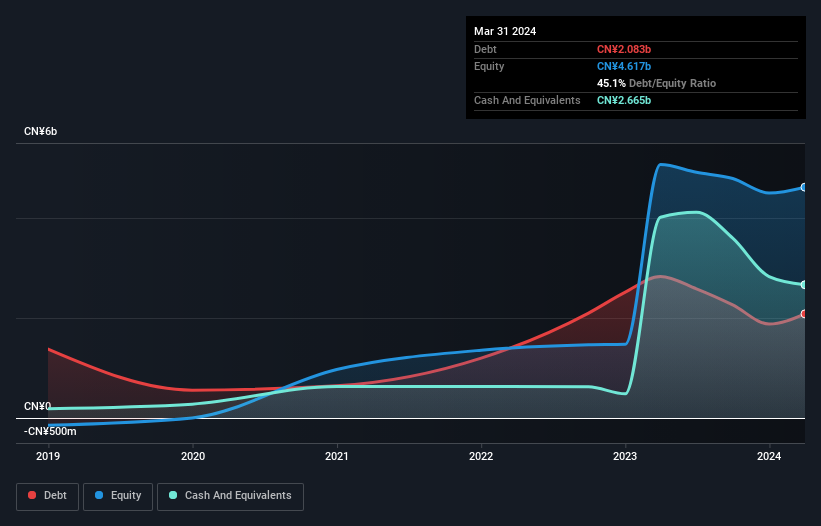
Some say volatility, rather than debt, is the best way to think about risk as an investor, but Warren Buffett famously said that 'Volatility is far from synonymous with risk.' When we think about how risky a company is, we always like to look at its use of debt, since debt overload can lead to ruin. Importantly, Greenworks (Jiangsu) Co., Ltd. (SZSE:301260) does carry debt. But the more important question is: how much risk is that debt creating?
Why Does Debt Bring Risk?
Debt is a tool to help businesses grow, but if a business is incapable of paying off its lenders, then it exists at their mercy. In the worst case scenario, a company can go bankrupt if it cannot pay its creditors. However, a more frequent (but still costly) occurrence is where a company must issue shares at bargain-basement prices, permanently diluting shareholders, just to shore up its balance sheet. Of course, plenty of companies use debt to fund growth, without any negative consequences. The first thing to do when considering how much debt a business uses is to look at its cash and debt together.
Check out our latest analysis for Greenworks (Jiangsu)
What Is Greenworks (Jiangsu)'s Net Debt?
As you can see below, Greenworks (Jiangsu) had CN¥2.08b of debt at March 2024, down from CN¥2.83b a year prior. But on the other hand it also has CN¥2.67b in cash, leading to a CN¥582.5m net cash position.

A Look At Greenworks (Jiangsu)'s Liabilities
According to the last reported balance sheet, Greenworks (Jiangsu) had liabilities of CN¥2.89b due within 12 months, and liabilities of CN¥1.38b due beyond 12 months. Offsetting these obligations, it had cash of CN¥2.67b as well as receivables valued at CN¥2.14b due within 12 months. So it actually has CN¥543.5m more liquid assets than total liabilities.
This surplus suggests that Greenworks (Jiangsu) has a conservative balance sheet, and could probably eliminate its debt without much difficulty. Simply put, the fact that Greenworks (Jiangsu) has more cash than debt is arguably a good indication that it can manage its debt safely. When analysing debt levels, the balance sheet is the obvious place to start. But ultimately the future profitability of the business will decide if Greenworks (Jiangsu) can strengthen its balance sheet over time. So if you're focused on the future you can check out this free report showing analyst profit forecasts.
In the last year Greenworks (Jiangsu) had a loss before interest and tax, and actually shrunk its revenue by 9.6%, to CN¥4.7b. That's not what we would hope to see.
So How Risky Is Greenworks (Jiangsu)?
By their very nature companies that are losing money are more risky than those with a long history of profitability. And in the last year Greenworks (Jiangsu) had an earnings before interest and tax (EBIT) loss, truth be told. And over the same period it saw negative free cash outflow of CN¥262m and booked a CN¥432m accounting loss. While this does make the company a bit risky, it's important to remember it has net cash of CN¥582.5m. That means it could keep spending at its current rate for more than two years. Overall, its balance sheet doesn't seem overly risky, at the moment, but we're always cautious until we see the positive free cash flow. There's no doubt that we learn most about debt from the balance sheet. But ultimately, every company can contain risks that exist outside of the balance sheet. Case in point: We've spotted 1 warning sign for Greenworks (Jiangsu) you should be aware of.
When all is said and done, sometimes its easier to focus on companies that don't even need debt. Readers can access a list of growth stocks with zero net debt 100% free, right now.
If you're looking to trade Greenworks (Jiangsu), open an account with the lowest-cost platform trusted by professionals, Interactive Brokers.
With clients in over 200 countries and territories, and access to 160 markets, IBKR lets you trade stocks, options, futures, forex, bonds and funds from a single integrated account.
Enjoy no hidden fees, no account minimums, and FX conversion rates as low as 0.03%, far better than what most brokers offer.
Sponsored ContentNew: Manage All Your Stock Portfolios in One Place
We've created the ultimate portfolio companion for stock investors, and it's free.
• Connect an unlimited number of Portfolios and see your total in one currency
• Be alerted to new Warning Signs or Risks via email or mobile
• Track the Fair Value of your stocks
Have feedback on this article? Concerned about the content? Get in touch with us directly. Alternatively, email editorial-team (at) simplywallst.com.
This article by Simply Wall St is general in nature. We provide commentary based on historical data and analyst forecasts only using an unbiased methodology and our articles are not intended to be financial advice. It does not constitute a recommendation to buy or sell any stock, and does not take account of your objectives, or your financial situation. We aim to bring you long-term focused analysis driven by fundamental data. Note that our analysis may not factor in the latest price-sensitive company announcements or qualitative material. Simply Wall St has no position in any stocks mentioned.
About SZSE:301260
Greenworks (Jiangsu)
Engages in the research and development, design, production, and sale of garden machinery.
Flawless balance sheet and good value.
Market Insights
Community Narratives



